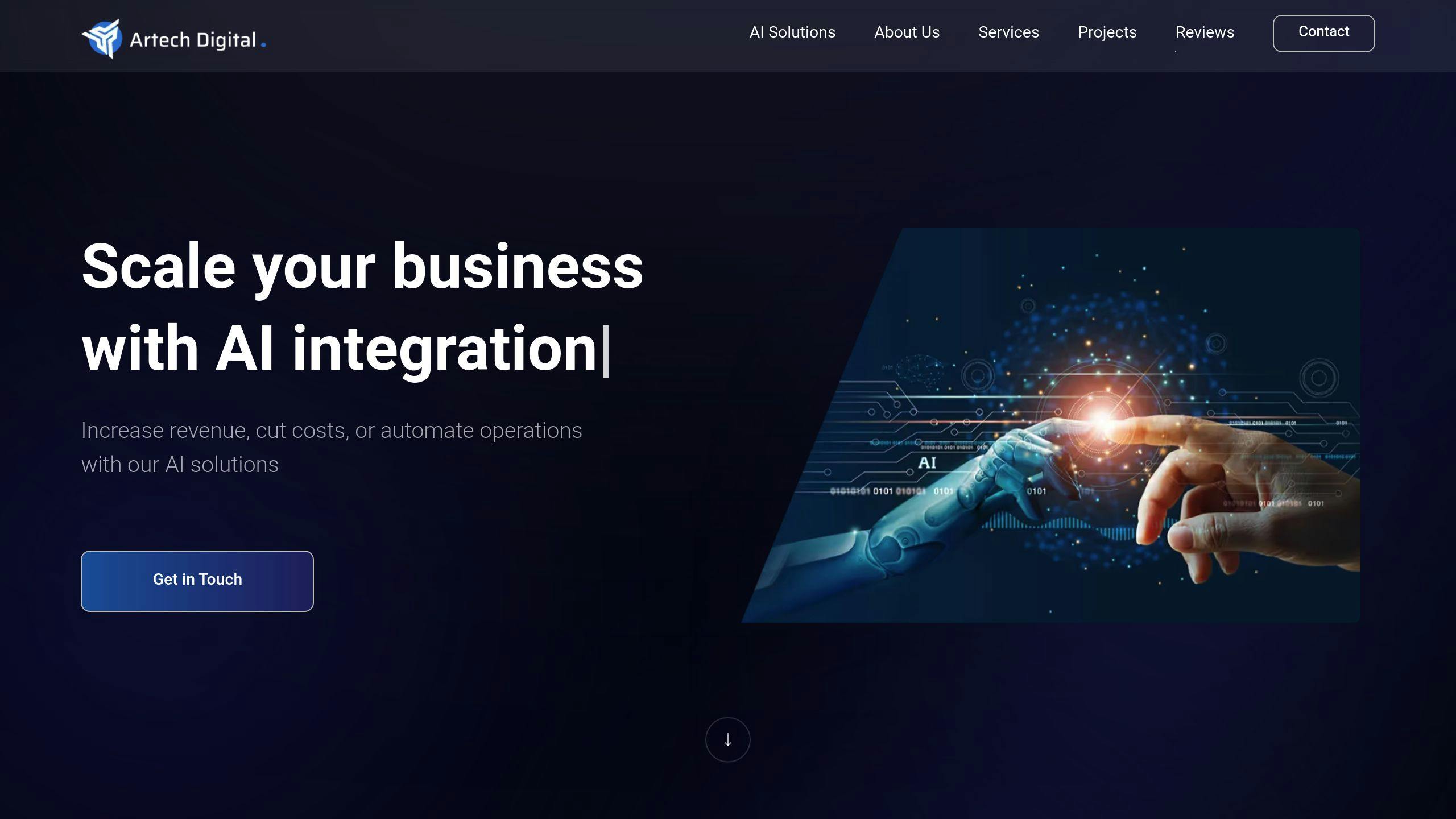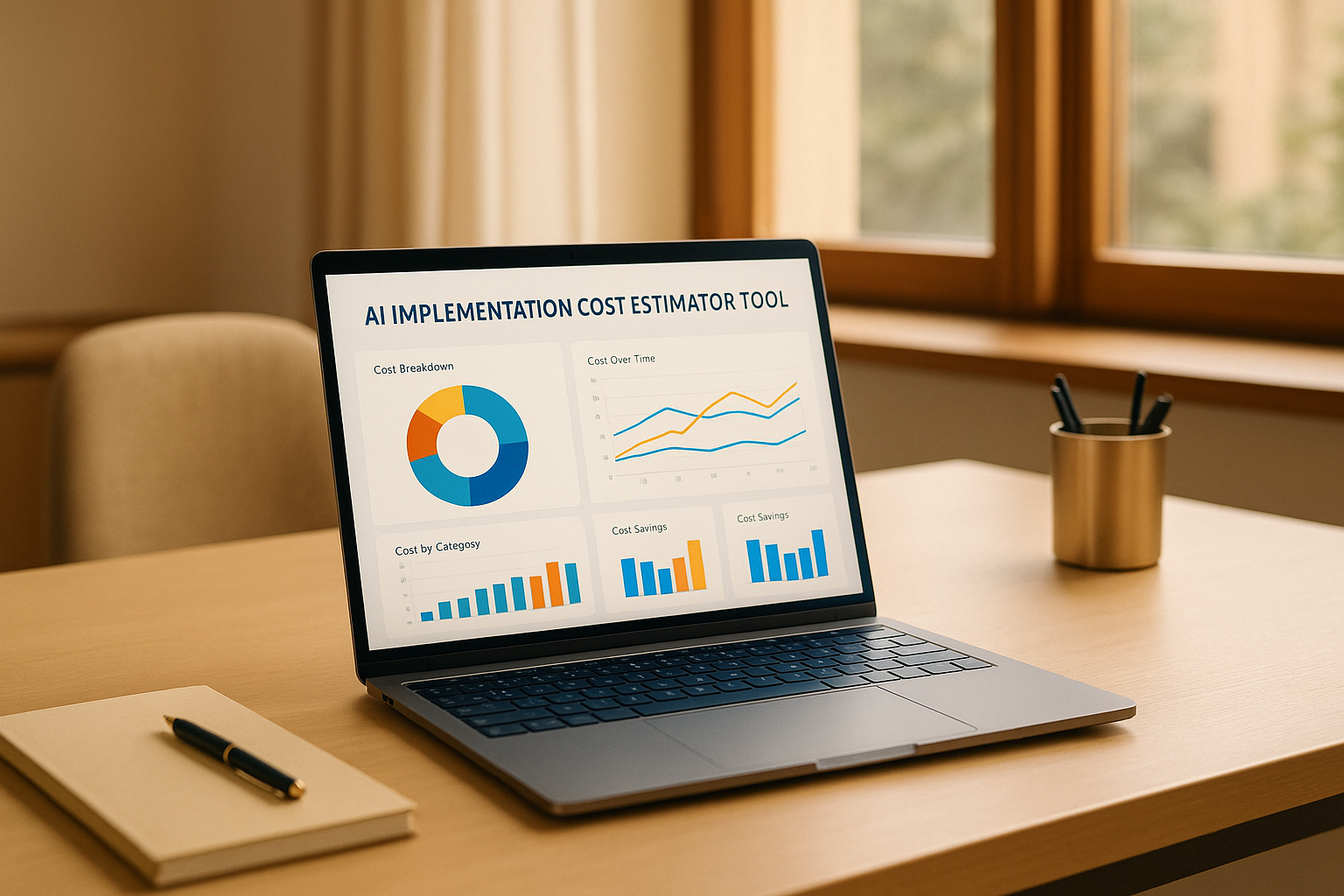
Choosing between custom AI and off-the-shelf AI solutions depends on your business needs, budget, and growth plans. Here's a quick breakdown:
| Feature | Custom AI | Off-the-Shelf AI |
|---|---|---|
| Initial Cost | $6,000–$300,000+ | $0–$40,000/year |
| Maintenance | $5,000–$20,000+ annually | Included in subscription |
| Development Time | 3–12 months | Immediate deployment |
| Customization | Fully tailored | Limited |
| Scalability | High, but costly | Vendor-constrained |
| Best For | Complex, unique needs | General business tasks |
Key Takeaway: Custom AI is ideal for industries like healthcare or finance with specific requirements, while off-the-shelf AI suits businesses with simpler, standardized needs like customer support or data analysis.
Custom AI solutions are built to address unique business challenges, such as automating intricate workflows or integrating with proprietary systems. These solutions give businesses full control over development, integration, and scaling, making it easier to adjust as requirements change.
One standout feature of custom AI is how well it integrates with existing workflows and systems. For instance, healthcare providers might use custom AI to analyze patient data and predict outcomes - delivering functionality that generic tools can't match [1][4].
Off-the-shelf AI is a cost-effective, pre-built option for businesses with straightforward needs like data analysis or automating customer service. These solutions are ready to deploy and come with a proven track record of reliability.
The biggest advantage here is quick setup and ease of use. However, these tools often lack flexibility and may not scale well with growing business demands. It’s important to weigh these limitations against long-term goals.
| Feature | Custom AI | Off-the-Shelf AI |
|---|---|---|
| Initial Cost | High upfront investment | Lower initial cost, subscription-based |
| Maintenance Cost | $200–350/hour for consulting | Included in subscription |
| Development Time | 3–12 months | Ready to use immediately |
| Customization | Full control and flexibility | Limited options |
| Integration | Seamless with current systems | May require adjustments |
| Scalability | Tailored to specific needs | Constrained by vendor limits |
| Support | Dedicated team | Standard vendor support |
| Best For | Complex, custom requirements | General business operations |
This table underscores the importance of balancing costs with business priorities when deciding between custom and off-the-shelf AI.
Understanding these differences sets the stage for diving into the specific cost factors tied to each option.
The upfront costs for custom and off-the-shelf AI solutions differ significantly. Custom AI development can cost anywhere from $6,000 to over $300,000, depending on the project's complexity and specific needs [2][3]. This includes expenses like consultations, requirement analysis, and the actual development work tailored to your business.
In contrast, off-the-shelf AI solutions are more budget-friendly, with annual subscriptions costing up to $40,000 [2][3]. Some platforms even offer free tiers for basic functionality, making them an attractive option for smaller budgets.
Custom AI solutions come with maintenance costs ranging from $5,000 to $20,000 annually, along with hourly consulting rates of $200-$350 for specialized support teams, such as developers and system architects [2][3][4].
| Maintenance Aspect | Custom AI | Off-the-Shelf AI |
|---|---|---|
| Hourly Support Rate | $200-$350 | Included in subscription |
| Annual Maintenance | $5,000-$20,000+ | Part of license fee |
| Update Frequency | As needed | Regular vendor updates |
| Support Type | Dedicated team | Standard vendor support |
Off-the-shelf solutions bundle maintenance and support into their subscription fees, offering a simpler approach for businesses that prefer predictable costs.
Scaling custom AI can cost between $50,000 and over $1 million, depending on the complexity of the required integrations and additional system upgrades. For businesses planning for rapid growth, these scalability costs should be part of long-term budgeting to avoid unexpected disruptions.
Off-the-shelf solutions typically include scalability within their subscription plans, but extra charges may apply if your needs exceed standard tiers. While simple integrations might take only a few hours, more complex projects could require 6-12 months to fully implement [4].
"80% of AI projects need regular updates to stay effective."
This highlights the importance of planning for ongoing costs, not just the initial investment. Whether you choose custom or off-the-shelf AI, aligning these expenses with your business's growth and operational goals is essential.
Understanding these cost factors can help you make a more informed decision, ensuring your AI investment matches your industry needs - a topic we’ll delve into in the next section.
Healthcare organizations like Mayo Clinic and Cleveland Clinic rely on custom AI to process vast amounts of patient data while seamlessly integrating with electronic health record (EHR) systems. These tailored solutions are crucial for managing sensitive health information securely and efficiently.
In the financial sector, large institutions use custom AI for fraud detection. These systems are designed to analyze specific transaction patterns and risk profiles, addressing the industry's high standards for real-time processing and security.
Manufacturers turn to custom AI for predictive maintenance. By analyzing equipment data, these solutions help monitor machinery performance and schedule maintenance, improving both cost efficiency and operational reliability.
Small-to-medium businesses in industries like SaaS and hospitality often prefer pre-built AI tools. These solutions are practical and affordable, offering features like automated customer service and basic data analysis.
| Industry | Typical AI Use Case |
|---|---|
| E-commerce | Customer support chatbots |
| Hospitality | Booking systems |
| Healthcare | Patient data analysis (custom) |
| Finance | Fraud detection (custom) |
| Manufacturing | Predictive maintenance (custom) |
Retailers also benefit from off-the-shelf AI for tasks like inventory management and customer relationship management. These ready-made solutions are easy to deploy and include standardized features that suit most retail needs.

Artech Digital provides a range of AI solutions, from basic chatbots and web applications to advanced machine learning models and computer vision tools for enterprises. Their tiered approach allows businesses to adopt AI at their own pace, based on specific requirements and budget.
For enterprise clients, Artech Digital offers comprehensive AI integration, ensuring systems are fully customized. Smaller businesses can start with simpler packages, which include features like web-based AI apps and intelligent chatbots capable of understanding and responding in natural language.
These examples show how businesses across sectors can align their AI strategies to match their goals and financial resources, whether opting for custom-built systems or pre-designed solutions.
In sectors like healthcare and finance, the decision between custom and off-the-shelf AI often comes down to balancing costs with specific operational demands. Custom AI provides tailored solutions but comes with higher upfront costs, while off-the-shelf AI offers a more affordable and straightforward option. These decisions affect not just initial expenses but also long-term maintenance and scalability.
The total cost of implementing AI is shaped by factors like development expenses, ongoing support, and scalability needs. For instance, professional AI consulting and maintenance services typically cost between $200 and $350 per hour [2][3], emphasizing the importance of planning for continuous support and updates.
To choose the best AI solution, businesses need to carefully assess their unique needs, future goals, and available resources.
Industries with specialized requirements, such as healthcare and finance, often lean toward custom AI due to the need for tailored security and compliance measures. On the other hand, sectors like e-commerce or hospitality, which have more standardized operations, often find off-the-shelf solutions more practical for their immediate and predictable deployment.
To align AI solutions with business goals and budgets, companies should:
Starting with basic AI capabilities allows businesses to test solutions while keeping risks low and optimizing their investment. This step-by-step approach ensures that AI adoption aligns with both current needs and long-term objectives.
The cost of AI solutions can vary significantly depending on the approach. Custom-built solutions often require an upfront investment ranging from $50,000 to $500,000, with yearly maintenance costs between $5,000 and $20,000 [2][3]. On the other hand, off-the-shelf tools come with more predictable pricing, typically through annual subscriptions priced between $0 and $40,000, which usually include maintenance and support [1][2].
When determining the total cost, businesses should factor in:
Industries like healthcare or finance often face higher costs due to strict compliance needs and intricate operations [3][4]. In contrast, sectors with more standardized processes may benefit from off-the-shelf tools, which strike a balance between functionality and cost.
Breaking down these costs allows businesses to align their AI investment with their operational goals. We'll dive deeper into this in the industry-specific applications section.


